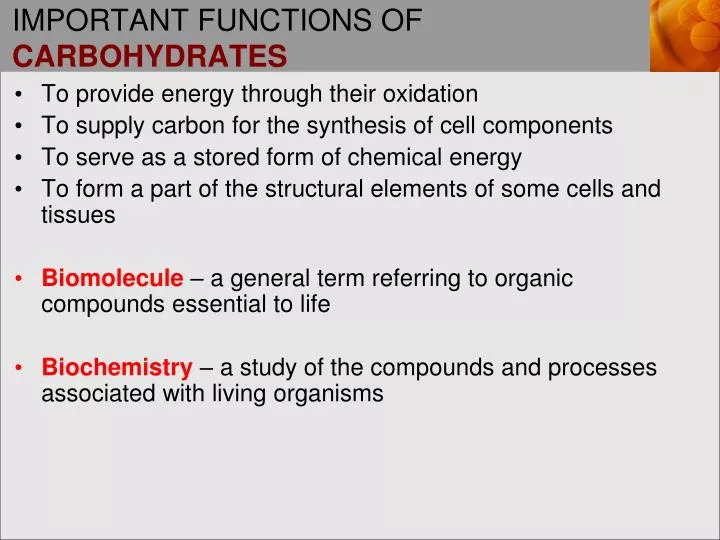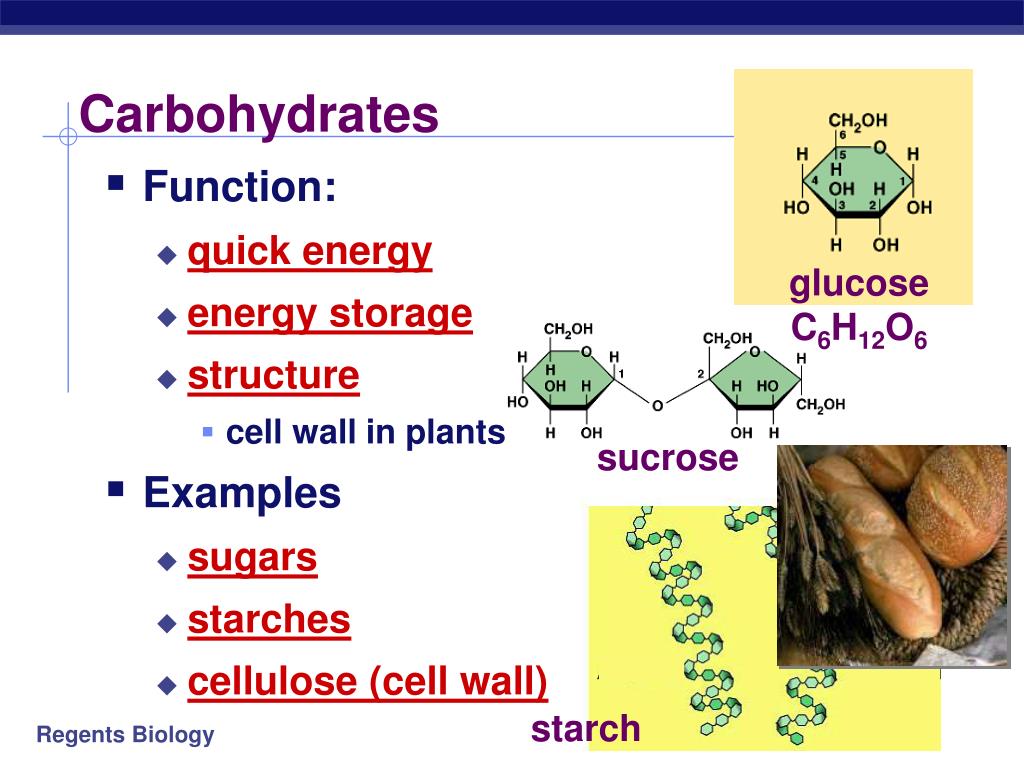what is the function of carbohydrates Carbohydrates function sugar structure examples cell sucrose ppt powerpoint presentation cellulose sugars
Carbohydrates are an essential part of our diet and play various roles in our body. They provide us with energy and also serve as a source of fuel for our brain and muscles. In this post, we will explore the functions of carbohydrates and understand why they are crucial for our overall well-being. First and foremost, carbohydrates act as a primary source of energy for our bodies. When we consume carbohydrates, our body breaks them down into glucose, which is then converted into adenosine triphosphate (ATP) - the molecule responsible for energy transfer in our cells. This energy is used for vital functions like breathing, digestion, and even something as simple as walking. Apart from providing energy, carbohydrates also assist in the regulation of blood sugar levels. When we consume carbohydrates, they are digested and absorbed into our bloodstream, causing our blood sugar levels to rise. In response to this, our pancreas releases insulin, a hormone that helps transport glucose from our bloodstream to our cells, where it can be used for energy. This process is crucial in maintaining stable blood sugar levels and preventing conditions like diabetes. Carbohydrates also play a vital role in supporting brain function. The brain primarily relies on glucose as its main source of fuel. When glucose levels in the brain decrease, it can lead to symptoms like dizziness, confusion, and difficulty concentrating. Including complex carbohydrates, such as whole grains, in our diet ensures a steady supply of glucose to the brain, helping us stay focused and mentally sharp. Furthermore, carbohydrates are essential for maintaining a healthy digestive system. Certain types of carbohydrates, known as dietary fiber, cannot be digested by our bodies. Instead, they pass through our digestive tract largely intact, adding bulk to our stool and facilitating regular bowel movements. Adequate fiber intake can help prevent constipation, promote a healthy gut microbiome, and even reduce the risk of conditions like heart disease and colorectal cancer. When it comes to physical performance, carbohydrates are invaluable. They are stored in our muscles and liver as glycogen, a form of energy reserve. During intense physical activity, such as running or weightlifting, our body taps into these glycogen stores to fuel our muscles. Consuming carbohydrates before, during, and after exercise helps replenish these stores and improves overall athletic performance. To illustrate the importance of carbohydrates, let’s take a look at the two images attached below. Image 1: Functions of Carbohydrates - Eschool  The image enumerates the various functions of carbohydrates in a visually appealing manner. It highlights their role in providing energy, regulating blood sugar levels, supporting brain function, and promoting digestion. The accompanying text explains each function in detail, making it easy to understand the significance of carbohydrates in our daily lives. Image 2: IMPORTANT FUNCTIONS OF CARBOHYDRATES PowerPoint Presentation  This presentation slide emphasizes the key functions of carbohydrates, such as providing energy, storing glycogen, and aiding in digestion. It further delves into the different types of carbohydrates, including simple sugars and complex carbohydrates, and their impact on our health. In conclusion, carbohydrates are more than just a source of energy. They perform a multitude of functions that are vital for our overall well-being. From providing energy for daily activities to supporting brain function and maintaining a healthy digestive system, carbohydrates are truly indispensable. Hence, it is crucial to include a variety of carbohydrates in our diet, focusing on complex carbohydrates like whole grains, fruits, and vegetables, to reap their numerous benefits. Remember, a well-balanced diet with an adequate intake of carbohydrates is key to maintaining optimal health and vitality. So let’s make sure to include these valuable macronutrients in our meals and fuel our bodies with the energy they need to thrive.
If you are looking for Functions of Carbohydrates - Eschool you’ve visit to the right page. We have 5 Pics about Functions of Carbohydrates - Eschool like Functions of Carbohydrates - Eschool, 8 Functions of Carbohydrates in Our Bodies - The Little Pine and also Functions of Carbohydrates - Eschool. Here it is:
Functions Of Carbohydrates - Eschool
 eschool.iaspaper.netcarbohydrates monosaccharides sugar glucose sugars eschool starch macromolecule iaspaper fructose sucrose disaccharides polysaccharides glycogen
eschool.iaspaper.netcarbohydrates monosaccharides sugar glucose sugars eschool starch macromolecule iaspaper fructose sucrose disaccharides polysaccharides glycogen
PPT - IMPORTANT FUNCTIONS OF CARBOHYDRATES PowerPoint Presentation
 www.slideserve.comfunctions carbohydrates important presentation ppt powerpoint slideserve
www.slideserve.comfunctions carbohydrates important presentation ppt powerpoint slideserve
8 Functions Of Carbohydrates In Our Bodies - The Little Pine
 www.thelittlepine.comfunction carbohydrates carbs bodies functions thelittlepine diagram food sugar starch fiber little infographic toc eating
www.thelittlepine.comfunction carbohydrates carbs bodies functions thelittlepine diagram food sugar starch fiber little infographic toc eating
8 Functions Of Carbohydrates In Our Bodies - The Little Pine
 www.thelittlepine.comfunction carbohydrates functions bodies carbs sugars carb digestion between lot there proteins fats debate infographic leaving macros many confused thelittlepine
www.thelittlepine.comfunction carbohydrates functions bodies carbs sugars carb digestion between lot there proteins fats debate infographic leaving macros many confused thelittlepine
PPT - Carbohydrates PowerPoint Presentation, Free Download - ID:257723
 www.slideserve.comcarbohydrates function sugar structure examples cell sucrose ppt powerpoint presentation cellulose sugars
www.slideserve.comcarbohydrates function sugar structure examples cell sucrose ppt powerpoint presentation cellulose sugars
Function carbohydrates functions bodies carbs sugars carb digestion between lot there proteins fats debate infographic leaving macros many confused thelittlepine. 8 functions of carbohydrates in our bodies. Carbohydrates function sugar structure examples cell sucrose ppt powerpoint presentation cellulose sugars